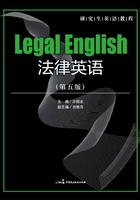
Ⅶ. Compare the legal terms in the brackets and then complete the sentences below.
1. This power of ________review/judicial separation)is indeed the most potent and pregnant fact of Supreme Court power and its most dramatic and controversial manifestation is in the vetoing by the justices of things done by the other two supposedly equal branches of the national government, the congress and the president.
2. The word ________(interpretation/construction)is used with respect to language itself; it is the process of applying the legal standard to expressions found in the agreement in order to determine their meaning. ________(Interpretation/Construction)on the other hand, is used to determine, not the sense of the words or symbols, but the legal meaning of the entire contract; the word is rightly used wherever the import of the writing is made to depend upon a special sense imposed by law.
3. ________(Federalism/Separation of powers)in American has traditionally referred to the coordinate relationship and distribution of power between the individual states and the national government.
4. In America,________ (statutes/acts)refers to a legislative act that the state gives the force of law. e. g. , American Courts interpret the usual wording of the abortion ________(statutes/acts), quite remarkably, to prohibit the removal of a dead fetus from the mother. In G. B, all Acts of Parliament are Statutes; but not all statutes are ________(statutes/acts)of Parliament.
5. ________(Administrative regulations/Statutory instruments)in G. B. are government orders akin to what in the U.S. are called“________ ”(administrative regulations/statutory instruments)and executive orders.
6. ________(Writ/Certiorari)is a (writ/certiorari)from a higher court to a lower one requesting a transcript of the proceedings of a case for review;________(writ/certiorari)is a written order issued by a court, commanding the party to whom it is addressed to perform or cease performing a specified act.
7. The U.S. Supreme Court will rule on the ________(constitutionality/unconstitutionality)of the new law.
8. The framers sought in various ways to guarantee the independence of each of the three branches. The ________(federal judiciary/president/members of Congress) was protected against criminal prosecutions while in office, answerable only in an impeachment trial with a super-majority required to convict. Members of the ________(federal judiciary/president/members of Congress)were given lifetime tenure, with a guarantee that there compensation would not be reduced. To ensure free discussion of controversial issues in Congress, the framers immunized ________(federal judiciary/president/members of Congress)from liability for statements made in House debate:for their“speech or debate”they“shall not be questioned in any other place. ”
9. The ________(power/right)of citizens of the United States to vote shall not be denied or abridged by the United States or by any State on account of race, color, or previous condition of servitude; The Congress shall have ________(power/right)to enforce this article by appropriate legislation.
10. A legislative proposal offered for debate before its enactment is ________(law/bill).